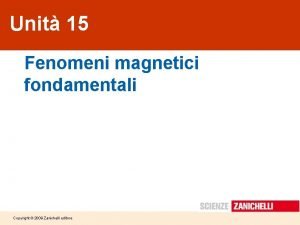4 1 Mahout PPT 4 1 1 Mahout








































- Slides: 40






4. 1 Mahout 《大数据》配套PPT课件 4. 1. 1 Mahout 安装 安装环境:Linux操作系统(Cent. OS 6. 5 )、 Hadoop平台(Hadoop 2. 5. 1) 1. 下载Mahout安装包 镜像网站 http: //mirror. bit. edu. cn/apache/mahout/ 2. 解压并安装Mahout 3. 启动并验证Mahout 6 of 44










4. 1 Mahout 《大数据》配套PPT课件 u 基于物品的协同过滤算法实现代码 public class Item. CFDemo extends Configured implements Tool{ public static void main(String[] args) throws Exception{ Tool. Runner. run(new Configuration(), new Item. CFDemo(), args); } @Override public int run(String[] args) throws Exception { Configuration conf = get. Conf(); try { File. System fs = File. System. get(conf); String dir="/itemcfdemo"; if (!fs. exists(new Path(dir))) { System. err. println("Please make director /itemcfdemo"); return 2; } String input=dir+"/input"; if (!fs. exists(new Path(input))) { System. err. println("Please make director /itemcfdemo/input"); return 2; } String output=dir+"/output"; Path p = new Path(output); if (fs. exists(p)) { fs. delete(p, true); } String temp=dir+"/temp"; Path p 2 = new Path(temp); if (fs. exists(p 2)) { fs. delete(p 2, true); } Recommender. Job recommender. Job = new Recommender. Job(); recommender. Job. set. Conf(conf); recommender. Job. run(new String[]{"-input", input, "--output", output, "--temp. Dir", temp, "--similarity. Classname", Tanimoto. Coefficient. Similarity. class. get. Name(), "--num. Recommendations", "4"}); } 16 of 44 } } catch (Exception e) { e. print. Stack. Trace(); } return 0;




4. 2 Spark MLlib 《大数据》配套PPT课件 4. 2. 1 聚类算法 实现代码 输出结果 import org. apache. spark. mllib. clustering. {KMeans, KMeans. Model} import org. apache. spark. mllib. linalg. Vectors [1. 5, 10. 5] [10. 5, 10. 5] 2 Within Set Sum of Squared Errors = 6. 000000057 // Load and parse the data val data = sc. text. File("data/mllib/points. txt") val parsed. Data = data. map(s => Vectors. dense(s. split("\s+"). map(_. to. Double))). cache() // Cluster the data into three classes using KMeans val k = 3 val num. Iterations = 20 val clusters = KMeans. train(parsed. Data, k, num. Iterations) for(c <- clusters. cluster. Centers){ println(c) } clusters. predict(Vectors. dense(10, 10)) // Evaluate clustering by computing Within Set Sum of Squared Errors val WSSSE = clusters. compute. Cost(parsed. Data) println("Within Set Sum of Squared Errors = " + WSSSE) 与Mahout下的k-means聚类应用相比,无论在代码量、易用性及运行方式上, MLlib都具有明显的优势 20 of 44


4. 2 Spark MLlib 《大数据》配套PPT课件 4. 2. 3 分类算法 0, 1 0 0 0, 2 0 0 0, 3 0 0 0, 4 0 0 1, 0 2 0 1, 0 3 0 1, 0 4 0 2, 0 0 1 2, 0 0 2 2, 0 0 3 2, 0 0 4 输出程序 Scala代码 Vector(0 0 9) 's label is 2. 0 Accuracy: 1. 0 加载训练数据文件 解析每行数据 训练模型 预测分类 22 of 44


















 Mahout
Mahout Apache mahout training
Apache mahout training Hadoop ecosystem
Hadoop ecosystem Mahout
Mahout Mahout
Mahout Zonele biogeografice ale terrei ppt
Zonele biogeografice ale terrei ppt Ziua drapelului republicii moldova ppt
Ziua drapelului republicii moldova ppt Yashpal committee report 1993 pdf
Yashpal committee report 1993 pdf Yaponiya ta'lim tizimi pdf
Yaponiya ta'lim tizimi pdf Xalqaro valyuta fondi ppt
Xalqaro valyuta fondi ppt Ppt-123
Ppt-123 Ppt123
Ppt123 Careea
Careea Pa state inspection checklist form
Pa state inspection checklist form Unsafe act and unsafe condition ppt
Unsafe act and unsafe condition ppt Vegetationsbrände ppt
Vegetationsbrände ppt Vertical axis wind turbine ppt
Vertical axis wind turbine ppt Shakespeare ppt template
Shakespeare ppt template William blake performer heritage
William blake performer heritage Iso 9001:2015 awareness presentation ppt
Iso 9001:2015 awareness presentation ppt Advantages of smart note taker
Advantages of smart note taker Rotary club powerpoint presentation
Rotary club powerpoint presentation Welingkar project we like ppt
Welingkar project we like ppt Global salinity map
Global salinity map Volkswagen case study ppt
Volkswagen case study ppt Vlsi ppt presentation
Vlsi ppt presentation Virtualization tools and mechanisms in cloud computing
Virtualization tools and mechanisms in cloud computing Vikor method example
Vikor method example Vibrating sample magnetometer ppt
Vibrating sample magnetometer ppt Präsentation vertriebsstrategie
Präsentation vertriebsstrategie Stages of venture capital financing ppt
Stages of venture capital financing ppt Micrometer worksheet doc
Micrometer worksheet doc Unnat bharat abhiyan ppt
Unnat bharat abhiyan ppt Sarva shiksha abhiyan ppt
Sarva shiksha abhiyan ppt Rashtriya madhyamik shiksha abhiyan ppt
Rashtriya madhyamik shiksha abhiyan ppt Enterprise resource planning lecture notes ppt
Enterprise resource planning lecture notes ppt Trapezoidal riemann sum
Trapezoidal riemann sum Discuss the role of computers in preclinical development
Discuss the role of computers in preclinical development Flesh coloured ppt
Flesh coloured ppt Campo magnetico ppt zanichelli
Campo magnetico ppt zanichelli Inter firm comparison advantages
Inter firm comparison advantages





























































